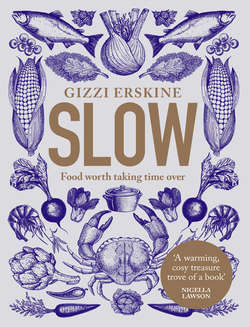Читать книгу Slow: Food Worth Taking Time Over - Gizzi Erskine - Страница 9
ОглавлениеSouped-up Kimchi Jjigae
A few years ago, I lived in Korea for almost six months while filming a show about Korean food. So believe me when I say Koreans live on kimchi – they have it for breakfast, lunch and dinner. But if you ask any Korean what their favourite dish is, they will all say jjigae. A jjigae is a stew and it’s the heart of Korean home cooking. Most people love Doenjang Jjigae which is made with the famous Korean miso paste, but the real red-blooded Korean loves Kimchi Jjigae with its gochujang spiced base and heaps of shredded kimchi. Classically it is made with pork belly, but the Buddhists (who abstain from groin-rumbling fiery chillies) make it without so it can be made vegan with vegan kimchi. The reason this is souped-up is because, although the Koreans call it a stew, I’ve made it a little more brothy. If you want to add carbs you can cook some Korean sweet potato glass noodles and add them to the base.
SERVES 4
Preparation time 20 minutes
Cooking time 30 minutes
splash of rapeseed oil
100g pork belly, thinly sliced or unsmoked bacon (omit if vegetarian)
2 onions, thinly sliced
1 tbsp gochujang paste if you like it spicy or 1 tbsp doenjang paste if you prefer it milder
2 garlic cloves, grated
2cm piece of ginger, peeled and grated
1–2 tbsp Korean chilli powder
1 litre fresh chicken or vegetable stock
400g kimchi, shredded
300g silken tofu, drained and cut into 12 slices
3 spring onions, finely chopped sesame seeds and toasted sesame oil, to serve
First heat a deep-sided frying pan over a high heat. Add a splash of oil followed by the pork belly or bacon. You want to render some of the fat and crisp it up, so fry it for about 8 minutes, moving it around the pan regularly. Once the pork is looking nice and caramelised, remove it with a slotted spoon and set aside. Add the onions to the pork fat and fry for about 5 minutes until they begin to soften and go translucent. (If you are making a vegetarian version, omit this stage and just fry the onions in a little rapeseed oil.)
Next add the spice paste of your choice. I prefer gochujang as I like a bit of extra kick, but you can get a great complexity of flavour from doenjang paste. Give this a stir and add the garlic, ginger and chilli powder and allow to sweat for a few minutes before adding the pork belly. After a couple more minutes pour in the stock. Bring this to the boil and allow to simmer for about 15 minutes. Finally, add the kimchi and simmer for a further 10 minutes.
When you are ready to serve, divide the soup between four bowls. Layer 3 slices of tofu per person on top of the soup, along with a sprinkling of spring onions, sesame seeds and a drizzle of toasted sesame oil.
